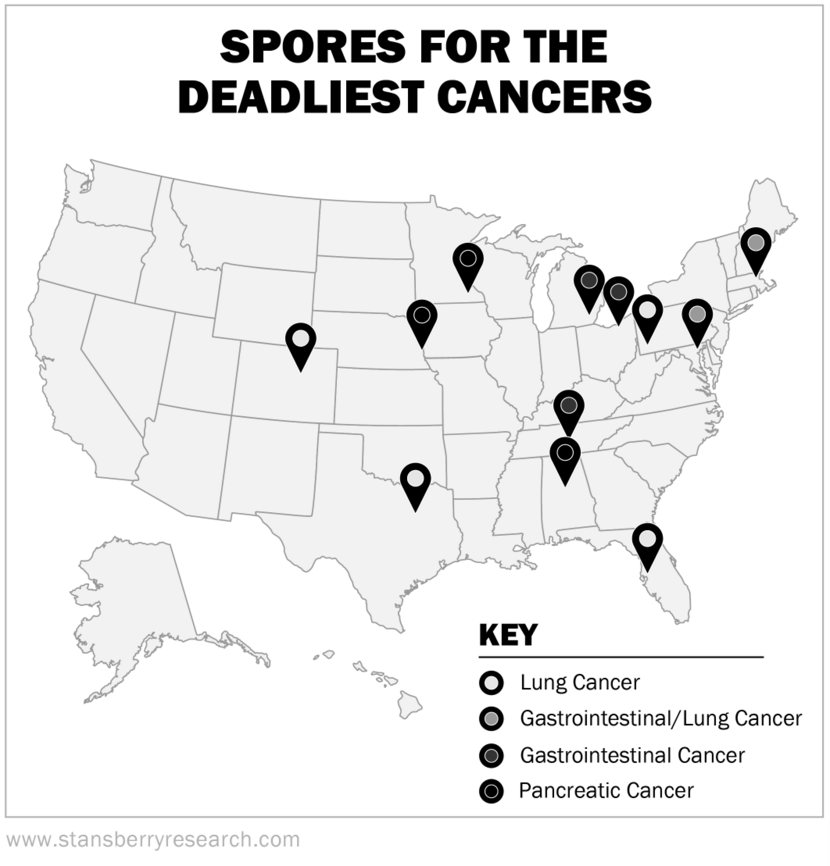Each year, more than $125 billion is spent on cancer care in the U.S.
And I'd wager that nearly everyone reading this letter has at some point watched a spouse, family member, or a close friend struggle with the disease.
Sadly, despite all the money and effort we've spent to battle cancer over the years – the U.S. government spends nearly $5 billion annually on cancer research – we've made little progress in overcoming cancer's lethal power.
The death rates for certain breast, prostate, colorectal, liver, and pancreatic cancer haven't changed significantly since the 1930s.
Getting the proper treatment could be the difference between life and death. And that's especially true if you have a cancer with a low survival rate. Esophageal cancer has a 17% five-year survival rate. It's slightly lower for those with liver cancer, at 15%. For those with pancreatic cancer – the deadliest cancer – the five-year survival rate is only 6%.
While the doctor who diagnosed you may have some suggestions regarding where you should get treatment, it's important to do your own research.
There are hospitals across the U.S. that specialize in the research and treatment of certain cancers.
When looking for treatment centers, the National Cancer Institute (NCI) has 69 "Designated Cancer Centers" in the U.S. These state-of-the-art centers are often leaders in advancements in cancer detection and treatment. You can find the list of NCI-Designated Cancer Centers here.
The NCI also has highly specialized treatment and clinical trial centers that focus on specific types of cancer, called Specialized Programs of Research Excellence (SPOREs). There are 62 SPOREs spread across 23 states.
The list is divided into organ locations. For example, if you're looking for SPOREs for liver cancer, you'd look under "gastrointestinal" in the organ-location list.
Where to Get Started
To help you get started with your research, we've listed the SPOREs that treat the deadliest cancers.
If you're looking for the best treatment for a particular cancer, these are some of your best options.
The SPOREs for pancreatic cancer are:
Mayo Clinic in Rochester, Minnesota
Website
Phone: (507) 284-2511
University of Alabama at Birmingham
Website
Phone: 1-800-UAB-0933
University of Nebraska Medical Center
Website
Phone: (402) 559-4000
The SPOREs for gastrointestinal cancers (including liver, esophagus, and stomach cancer) are:
Case Western Reserve University
Website
Phone: (216) 844-8797
Dana-Farber Harvard Cancer Center
Website
Phone: 1-877-420-3951
Johns Hopkins University
Website
Phone: (410) 955-5000
University of Michigan
Website
Phone: (734) 647-8902
Vanderbilt University
Website
Phone: 1-877-936-8422
The SPOREs for lung cancer are:
Dana-Farber Harvard Cancer Center
Website
Phone: 1-877-420-3951
Moffitt Cancer Center and Research Institute
Website
Phone: 1-888-663-3488
Johns Hopkins University
Website
Phone: (410) 955-5000
University of Colorado Cancer Center
Website
Phone: (303) 724-3155
University of Pittsburgh Cancer Institute
Website
Phone: (412) 647-2811
University of Texas Southwestern Medical Center
Website
Phone: (214) 648-3111
You may not have the resources to go to these centers for treatment – the costs and travel may be outside your budget – but these centers may have the resources to help you.
You can also utilize information from cancer foundations. The Leukemia & Lymphoma Society, for example, has links to hospitals at the forefront of blood-cancer research, information on financial and emotional support, and in-depth information about the different types of blood cancers.
What We're Reading...
- Something different: Smog in China is causing chaos.
Here's to our health, wealth, and a great retirement,
Dr. David Eifrig and the Retirement Millionaire Daily Research Team
January 5, 2017
P.S. If you’ve received a cancer diagnosis, you must read my list of the top 10 questions to ask your cancer doctor. These include subjects like pathologic tissue samples, National Cancer Center Network guidelines, and survival rates.
I’ve included all 10 questions along with other resources in my book, The Living Cure. You can read more about finding treatments centers, advancements in cancer treatment, how to find clinical trials, and more.
The Living Cure is a great resource for anyone with cancer or who knows someone with cancer. Order your copy today, right here.

